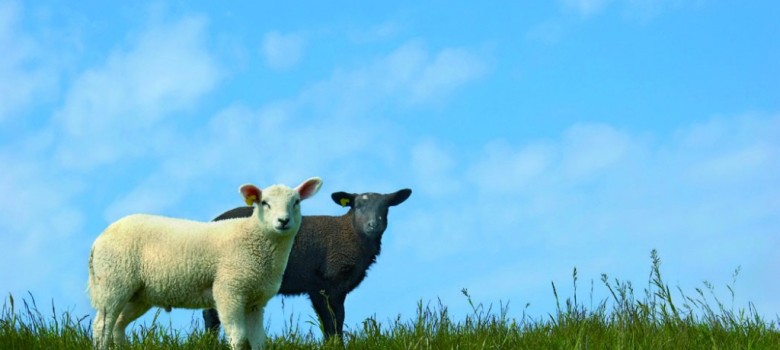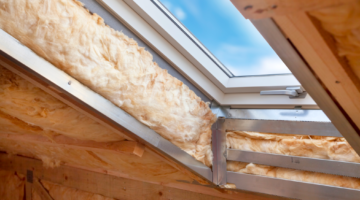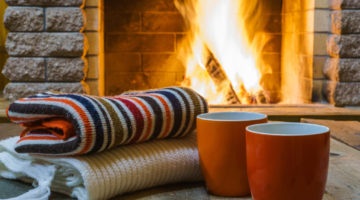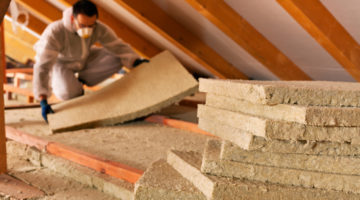
Insulation is one of the best ways to help increase the energy efficiency of the home. One of the most natural and sustainable ways to insulate your property is to use sheep wool insulation. Most of us are familiar with the woollen jumper, but now you can actually use sheep wool insulation to help keep your home warm in the winter and cooler in the summer!
Now there is no denying you will be paying a premium for the sheep wool, but we have listed 5 features below that should make paying that little bit extra all worth it!
Sheep wool insulation is an outstanding insulator
For thousands of years sheep have been able to survive the elements using their wool coats to protect them from extreme cold and heat. Due to the crimped nature of wool fibres, they form millions of tiny air pockets that trap air, helping to provide a thermal barrier.
Thermal conductivity is the ability for heat to pass from one side of a material through to the other. It is measured in W/mK, where a lower value signifies a better insulator.
Sheep wool insulation has a thermal conductivity of between 0.035 – 0.04 W/mK, where as typical mineral wool has a thermal conductivity of 0.044 W/mK.
Sheep wool purifies the air
Sheep wool is proven to absorb and neutralise harmful substances – the wool is a natural protein made up of a number of different amino acid chains (18 to be exact!) of which 60% have a reactive side chain.
These reactive areas allow the wool to absorb harmful and odorous substances including Nitrogen Dioxide, Sulphur Dioxide and Formaldehydes and neutralise them through a process known as Chemisorption.
So using the sheep wool as insulation actually has health benefits and creates a feel-good indoor climate.
Sheep wool regulates humidity
Sheep wool can absorb 33% of its weight in moisture without compromising its insulating ability. The core of the sheep wool fibre is hygroscopic, meaning that it will absorb water vapour – making it perfect in the loft space where you tend to encounter more condensation.
Sheep wool offers outstanding sound insulation
Sheep wool offers fantastic acoustic insulation – far better than comparable insulating wool materials. Therefore it is becoming increasingly popular in schools and offices to help aid concentration in the classroom and ensure meetings can be held undisturbed.
Sheep wool insulation does not burn
A great thing about sheep wool is that it doesn’t burn; it is just about the only fibre that naturally resists flaming and as soon as the flame is removed it will actually self-extinguish.
As a result of the wool’s high nitrogen content, it will simply smoulder and singe away instead of bursting into flame. In fact you will need to heat the wool to a temperature in excess of 560°C before it burns.
Sheep wool doesn’t itch
One of the main reasons why we like sheep wool and recommend it so highly is that it is really easy to work with. Both the glass wool and rock wool cause major irritation if you handle them with bare skin and can cause damage to lungs and eyes. Therefore it is strongly recommended that you wear a mask and goggles when installing either of these. However, sheep wool insulation is a breeze to work with as it is safe and harmless – lie on the stuff and it would just feel soft and fluffy like a woollen jumper!
We think that the majority of people will want to insulate their own lofts as part of a DIY job, so the fact you can easily handle the sheep wool makes the job far simpler. It is important to stress though, that if you are in any way uncomfortable with trying to insulate your own loft, please get in touch with a professional to carry this job out for you.
Sheep wool is sustainable
The final point is that sheep wool is 100% natural product – Since sheep naturally produce the wool, it requires a fraction of the energy to produce than man made wool equivalents – with most of this energy required to wash the wool before it is used.
In fact, sheep wool requires less than 15% of the energy used to manufacture glass wool, so from a sustainable point of view there is only one winner!
Think we missed something? Do you have a different opinion?
Comment below to get your voice heard…












Does the wool have to be treated in any way? Coming from Shetland where we are surrounded by sheep I would be interested in buying locally and so reducing the carbon footprint of my insulation.
Hi
What kind of treatment is using against moths ?
Fill your home with ceder, sticky tape, and vinegar.
I live in Western Australia and I had wool insulation installed in our ceiling 11 years ago but it is now infested with carpet beetle! I have had Pest Control treatment and 6 months later and 2 further inspections reveal larvae are still there and active. This means I either have to have it re=treated or I will have to replace the insulation some other material which is very disappointing.
Given this article on the BBC today, it seems that sheep wool as insulation is either being ignored or nobody is looking to widen the market
https://www.bbc.co.uk/news/business-53421546
Show do l prepare a sheep’s fleece for loft insulation including washing.ww
How does it compare price wise with Rockwool insulation.
Yes, I would like to know this, Linda, and also how it compares environmentally and for insulation..
Very good article but I need to stop threatening my family.
How does it compare with Rockwool for sustainability AND insulation?
Two questions:
1) How do you stop clothes moths eating your insulaltion?
2) Apart from faecal soiling, why does the woold need to be washed? It won;t be in contact with people except when being installed, when you can wear protective clothing.
Do you have figures for the thermal conductivity measurements at various moisture contents so I can gauge effectiveness in damp environments compared to an air cavity?
Hello! Great article! Thanks for writing it. Can you let me know why its important to wash the wool before using it as insulation?
I have a large amount of untreated sheep’s wool that I want to use to insulate a cabin in my garden. Is there a product I can buy that I can use to treat the sheep’s wool myself to minimise wool moth?